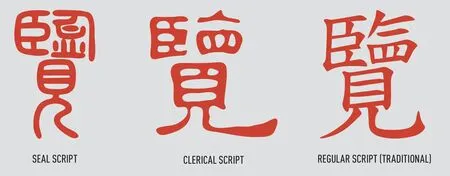览
2022-04-20
A character that’s worth a look
会当凌绝顶,一览众山小

Climbing to the top of a mountain and looking out at the vast view below has been the start of many Chinese poems passed down through the ages.A single glance from a mountain top was all it took for poets to start grieving the changing of the seasons,wallowing in nostalgia,venting their homesickness,and lamenting over their lives or the future of the country.
Eighth century poet Du Fu (杜甫),one of China’s greatest poets,wrote of his ambitions to conquer personal obstacles during a journey to Taishan Mountain in Shandong province when he was 24.It led to one of his most well-known poems,“Gazing on the Peak (《望岳》)”:“Someday may I climb up to its highest summit,and with one sweeping view see how small all other mountains are (会当凌绝顶,一览众山小 Huì dāng líng jué dǐng,yì lǎn zhòng shān xiǎo).”There are lots of Chinese terms related to seeing,but Du Fu decided that“one sweeping view,”or“一览 (yì lǎn),”was enough for him to belittle the other mountains.
The character 览 (lǎn) is one of many Chinese terms meaning“to look,”“to view,”or“to quickly and roughly look through.”The earliest form of the character appeared in small seal script in the Qin dynasty (221–206 BCE).In theAnalytical Dictionary of Chinese Characters(《说文解字》),one of the earliest Chinese dictionaries,览 was defined as“to watch;made up of the radical 见 (jiàn) and the upper part of the character 监 (jiān).”The character见 was first seen in the oracle bones of the Shang dynasty (1600–1046 BCE),resembling a figure with big eyes on its head,meaning to open one’s eyes wide to see something.The character监 was originally a figure watching its reflection in a wash basin.When combined together,the character became 览,which was simplified over history into its present form.
In“The Prose of Consideration and Caution (《思慎赋》),”the seventh and eighth century Chinese historian and politician Liu Zhiji (刘知几) wrote“明镜可以览行 (míngjìng kěyǐ lǎn xíng),”meaning a bright mirror could help one see one’s true self.The meaning of 览 hasn’t changed much from ancient times to the present day.In modern Chinese,words containing览 are often related to browsing and looking in a general sense—usually not very closely or carefully.To read a book or newspaper is 阅览 (yuèlǎn),and the reading room in the library is called 阅览室 (yuèlǎnshì).The idiom博览群书 (bólǎn qúnshū) means that someone is very widely read.To look through something quickly is called 浏览 (liúlǎn),and the browser you use for reading information online is called 浏览器 (liúlǎnqì).
览 is also used for viewing out-ofdoors.For instance,to go sightseeing on your travels is 游览 (yóulǎn),and if you are pleased by what you see,the word for you is 饱览 (bǎolǎn).览胜(lǎnshèng) means to visit some famous historical sites,and if one of your goals in life is to feast your eyes on all of the famous mountains and historical relics around the world,or 饱览名山胜景 (bǎolǎn míngshān shèngjǐng),China is a necessary stop on your journey.
When paired with the character展 (zhǎn),览 also becomes part of a noun meaning“exhibition.”In many large cities today,there are all kinds of exhibitions to see any given weekend,such as a 摄影展览 (shèyǐng zhǎnlǎn,photography exhibition),艺术展览(yìshù zhǎnlǎn,art exhibition),or even汽车展览 (qìchē zhǎnlǎn,auto show).The places where these exhibitions are held is a 展览馆 (zhǎnlǎnguǎn,exhibition hall).Some of these events are large enough to attract exhibitors from all over the world,such as the World Exposition or 世界博览会 (Shìjiè Bólǎnhuì)—the delayed 2020 edition was held in Dubai until the end of March this year.
No matter how you decide to use your eyes—to watch,see,read,observe,or stare—perhaps nothing will give you a better view than standing tall in a wide open space,where everything is 一览无余 (yìlǎn wúyú):meaning you can take in everything in one glance.


